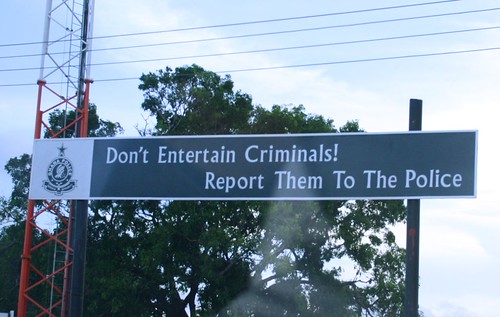Why you're (Probably) a Criminal - Wednesday, August 19, 2009  The recent story of a 10-year old girl ticketed for selling lemonade and cookies in the park is not only a ridiculous embarrassment for NYPD and for our criminal justice system generally, but it also underscores the alarming over-criminalization trend in our country. If 10-year old Clementine Lee can labeled a criminal for selling her lemonade in the park, then what does that mean for the rest of us? The recent story of a 10-year old girl ticketed for selling lemonade and cookies in the park is not only a ridiculous embarrassment for NYPD and for our criminal justice system generally, but it also underscores the alarming over-criminalization trend in our country. If 10-year old Clementine Lee can labeled a criminal for selling her lemonade in the park, then what does that mean for the rest of us?
This disturbing trend is highlighted in an excellent essay written by Judge Alex Koziniski and Misha Tseytlin. As they put it, "most Americans are criminals, and don't know it, or suspect that they are but believe they'll never get prosecuted." It has been reported that the Congressional Research Service cannot even county the current number of federal crimes! Why? Because, as a Heritage Foundation Report notes: According to the ABA, there are in excess of 3300 separate criminal offenses and nearly 10,000 “regulations” that have criminal sanctions. And these laws are scattered in over 50 titles of the United States Code, encompassing roughly 27,000 pages. Worse yet, the statutory code sections often incorporate, by reference, the provisions and sanctions of administrative regulations promulgated by various regulatory agencies under congressional authorization. This has become such an issue that on July 22, the House Judiciary Committee held a hearing on the Over-Criminalization of Conduct/Over-Federalization of Criminal Law. In his testimony before the committee, Hon. Richard Thornburgh rightfully raises the question: "If legal scholars and researchers and the Department of Justice itself cannot accurately count the number of federal crimes, how do we expect ordinary American citizens to be able to be aware of them?"
More than just a systemic degradation of the basic precepts of our criminal justice system, the immediate concern to everyone should be one that Krister Everston, a victim of this over-criminalization, pointed out in his testimony before the Judiciary Committee: "Ordinary citizens, even people trying to do good, are at great risk of criminal prosecution, conviction, and imprisonment." It's easy to fall back on old tropes like, "Ignorance of the law excuses no one,", and it's true, as far as those things go. But how meaningful is a principle like that when it's your ten year old being criminalized? (image via Chris_Wilson’s flickr) Labels: in the news, over-criminalization
posted by Kristin Etter
permalink
 
|
0 Comments:
Post a Comment
<< Home